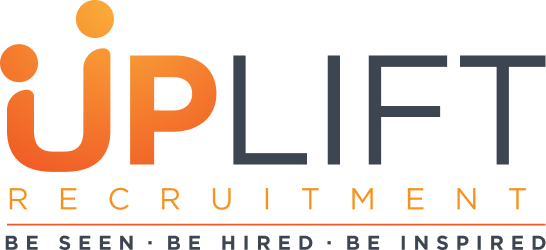
What is it about finding a new job that strikes fear in the hearts of so many?
Humans tend to naturally avoid things that scare us. The words “job interview” or “career change” are a red flag. Danger ahead. Our instinctual brain causes us to react before we have analyzed the threat. Overthinking whips us into a state of constant anxiety and stress in the days leading up to submitting an application, going to a job interview, or starting a new position. To conquer our job related fears, we need the ability to tell our caveman and cavewoman brains, “no, that’s not a woolly mammoth or a rival tribe in warpaint, it’s just a hiring manager.”
In this post, we are going to go over some the most common job fears, what they mean, and what to do about them. After years and years of helping candidates land their dream jobs and helping clients vet out the incompatible from the pros, Uplift Recruitment understands your job search fears. We also know a few tricks to help you harness your fears and use them to your advantage. Read on if you get nervous about any part of a quest for a new job.
Start Here: KNOW Fear
Sweaty palms, um’s and ah’s, dilated pupils, nausea, and loss of sleep are all tell-tale signs of stress and fear. All these things are extremely common in job candidates. Have you ever experienced these symptoms in relation to landing or starting a new job? If so, did you ever sit down and figure out exactly why?
Ask yourself:

- What exactly scares you about an upcoming job interview?
- Why are you scared to start at a new company?
- What exactly is stopping you from starting your job search, even though you tell everyone you hate your job?
- Where you have felt fear or anxiety during any part of your career?
It’s time to dive deep into yourself – your goals, fears, motivators, and the repercussions of past experiences. It’s time to get to know what you fear. The reality is that the anticipation of pain is often actually worse than the event itself. We get so worked up over bad things that haven’t happened yet that we are paralysed, unable to take action to save ourselves, or drastically improve our lives.
If you wish to conquer your fears, don’t try to ignore them or shove them into some back closet. Get to know and understand your fears by explicitly describing them.
Defining what scares you most allows you to (1) actively prepare to face each fear, (2) let the things you cannot control go.
So take time to list out every worst-case, nightmare scenario that could possibly happen during every part of your job search.
Uplift’s Common Job Fears:
- You won’t hear back regarding your application
- You’ll spend lots of time on an application for no reason
- Rejection during any stage (application, interview, probation period)
- You won’t be able to do the job
- You’re not good enough because of xyz
- You fear change
- You won’t get the salary you deserve
- Your profession or personal past may rear its head
- Fulfil your worst case scenarios
Don’t Just Sit There, Take ACTION
You’ve probably heard this a million times, but the key to job search success is preparation. From your application to your interview to your first day on the job, you must actively ensure your success by doing your homework. The same principle applies to overcoming any sort of fear. Awareness and knowledge of what’s holding you back is the first step but not the last. Once you’ve listed out your job related fears, scan your list for things outside your realm of control. If you’re afraid of changing jobs because you might get a bad boss, transferred to a new location, or because of the weather, it’s time to let go. While we’re on the subject, letting go of things you cannot control is one of life’s all time greatest hacks.
The Dalai Lama described it best, “If you have fear of some pain or suffering, you should examine whether there is anything you can do about it. If you can, there is no need to worry about it; if you cannot do anything, then there is also no need to worry.”
Now go through your list of fears from above and cross off the things you have no control over. If there is nothing you could do to prevent or remedy that scenario, then you must let it go.
Next, your job is to prepare for the things you can control.
Research shows that one of the best antidotes your brain’s instinctual fight or flight response to fear is ACTION. So be proactive when crafting a comprehensive plan of action to tackle what you are afraid of by being very detailed.
Application Fails?
Every job application requires time and commitment. You must get to know the company and the role. You should analyse how your skillset fits with the job requirements. Spend a fair amount of time writing a cover letter, changing your resume, and fulfilling any other requirements like a test project or questionnaire.
Once you submit all this work, more often than not, you won’t hear anything. Crickets. Radio silence. Zero feedback because you’re playing a numbers game where the odds are not in your favour. You must recognize that you have NO control over whether a hiring manager chooses to interview you. You also need to accept that someone else may have been a better fit for the job. Put your best effort into every application, hit “submit,” and let go.
You need to be aware of the fact that applying for many different types of jobs repeatedly and continuously will be noticed by companies and recruitment agencies. This kind of shotgun approach does not work in your favour. Instead, look at your experience, understand at the brief, and design a cover letter accordingly. There is nothing wrong with moving into a different or industry role, but clarify “WHY” you are doing so in your cover letter!
Interview Anxieties?

Here’s where the need for preparation gets real. Don’t expect to just show up and kill it at your next interview. You need to learn as much about the company, the interviewing manager, and the role as you can. You also should practice. Rehearse how you would answer common hypothetical interview questions. Have a friend pretend to interview you. Work on your body language in front of a mirror. Go to as many job interviews as you can just for the experience. Beyond practising, try putting yourself in the interviewer’s shoes. Ask, “What are the hiring manager’s needs? How can I be the person they need right now?”
Take each experience as a learning one and ACTUALLY learn from it. Be humble and open to feedback/rejection.
On-the-Job Blunders?
Many people are afraid of actually landing their dream job because they worry that they won’t be able to live up to expectations once they start. Our best advice for those in this boat is to apply for jobs you actually want. Make sure you’re passionate about what you’ll be doing. It will be much easier to back yourself and kill it if you really want to be there. Forget impostor syndrome, if you made it through a competitive job search, it’s time to start backing yourself.
Be yourself and be realistic with the job you are going for and don’t LIE. This is the worst thing you can do. Get the job you deserve based on WHO you are and what you actually can bring. It will come out eventually! Believe us!

Get Over the Past Through POSITIVITY
Remember when you wrote a list about everything you feared about finding a new job? If you uncovered a specific negative experience that shadows your plans for the future, it’s time to upgrade your brain with positivity.
If you love a second chance, you’ll love the concept that our brain changes and is constantly rewiring itself, even in adulthood. This means you’re not stuck with old memories and their psychological repercussions. You’ve got a second chance to intentionally mould and change your brain throughout life.
Without going into great detail about neurology, you should know that every experience causes neurons in our brain to “fire” or become activated with electrical signals. These neurons become linked to other neurons creating an association that can cause us to form an expectation about a certain event or emotion.
Let’s say you went to a job interview and figured out quickly you were unprepared. The hiring manager peppered you with difficult hypothetical questions and judged your answers with long, awkward silences. You really wanted this job but, needless to say, you didn’t get it. You were pretty devastated at the time. Your brain may create a neurological connection between job interviews and negative emotions. Thus, every time you think about getting a new job, you start dreading the interview and making up excuses to avoid that pain again.
In this situation, it’s time to shine a new light on this old fear. The bad news that changing old negative memories requires that you revisit that fear. The good news is that by specifically triggering that fear, you have an opportunity to create a new positive memory that will erase the fear forever. The more you trigger the fear and rewrite the memory with positivity, the more likely you will permanently rewire your brain. So, if something bad happened to you during a job interview, you must get back on the horse and interview again. You are going to do as many job interviews as possible and reinforce everything positive that happens at each interview.
This process of highlighting positive experiences to make the fear go away is called “extinction” by psychologists. When you repeatedly align your beliefs, feelings, vision, and actions to positivity you will experience lasting changes in your brain.
What is the Price of Fear?
“We suffer more in imagination than in reality.” – Seneca
Taking a good, long look at the fears you have about making power moves in your career can be enlightening. By clearly knowing your fears, you will be able to actively prepare for them. You can also deal with negative baggage that is holding you back by deliberately creating positive experiences out of negative ones. Once you’ve realized that your fears are not as bad as you thought and have a plan to tackle anything that comes up, I suggest you watch Tim Ferriss’ Ted Talk about what he calls “fear setting,” which will bring to light the costs to you personally of letting these fears plague your life. You can do better. Don’t let your fear control your destiny.

